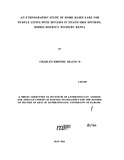| dc.description.abstract | This study investigated the dynamics of home-based care for people living with
HIV/AIDS in Nyang'oma Division in Bondo District of western Kenya. Specifically, the
study sought to investigate the healthcare support available for people living with
HIV/AIDS in the study area and examined the influence of socio-economic and cultural
factors on the care of HIV -infected persons at home. The study subjects were mainly
people living with HIV/AIDS and their caretakers as well as community health workers.
Health care institutions and NGOs involved in the care of HIV infected persons and the
elderly persons considered to have good knowledge of the community in terms of cultural
practices and experiences of care giving in the traditional past were also included in this
study.
The study design was longitudinal and adopted qualitative and quantitative methods of
data collection. Specifically qualitative data were gathered through focus group
discussions, narratives, key informant interviews and' in-depth interviews. Quantitative
data were collected using semi-structured interviews. Qualitative data were analyzed
using non-computerized methods while quantitative data was analyzed using the SPSS
software.
The findings show that there is inadequate health care support for people living with
HIV/AIDS in the area. Bondo District hospital as the main referral facility is inaccessible
due to long distance and high transport costs. Other equipment like the CD4 machine was . I
not available in Bondo District during the better part of research period until CDC finally
installed the facility in November 2006, when the study was almost winding up.
However, many HIV/AIDS patients still go for treatment in far places and do not link
with any NGO for support for fear of stigma
The partnership approach of incorporating the community into the care programme has
led to a situation where patients are cared for by a constellation of people here referred to
as the care management groups (CMG). The groups include CHWs, the patients
themselves and the family members as well as friends. However, the groups keep on
changing as care demand increases and in the long run leaving only close blood relatives
to care for the HIV infected persons. Women living with HIV/AIDS are mainly cared for
by their own children. The study also shows that shortage of food leads to poor drug
adherence as the HIV/AIDS patients complain that they cannot take drugs on an empty
stomach. Poor drug adherence is also partly as a result of the fact that a majority of the
patients keep their HIV status secret and no one can remind or encourage them to take
drugs when time is due.
The supporting NGOs generally face shortage of medicines, finances and other logistics,
which make many HIV/AIDS patients transfer to other new in-coming NGOs considered
to have adequate resources. The study also indicates that integration of CHWs into the
home-based care programme is unreliable as those aged 40 years and below pull out
while others move to new NGOs that can afford to provide some incentives. The transfers
generate tensions among the NGOs.
Cultural beliefs in witchcraft, chira, and spirit possession not only delay going for VCT
but also influence those who have tested HIV positive to ignore ARVs and use traditional
concoctions instead. Cultural practice of wife inheritance engenders poor housing
conditions for widows living with HIVIAIDS, who do not have men to inherit them. In
addition, the rule of contact and spatial avoidance among in-laws, parents and their adult
children also inhibit proper nursing care among these close relative, which then pushes
care into the hands of young children and unreliable distant people. | en |

